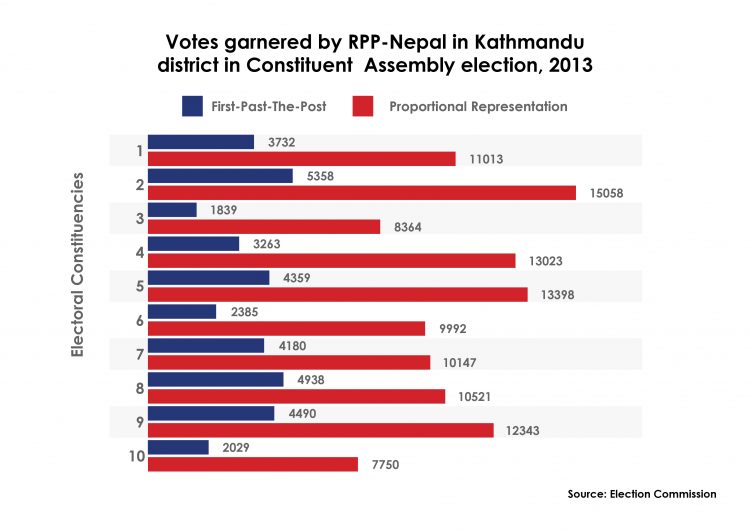RPP-N had done better in Kathmandu than in Jhapa in 2013 CA election
Mohan Mainali / February 20, 2017

Graphic: Bikram Rai
Addressing the inaugural session of the first general convention of the unified Rastriya Prajatantra Party (RPP) in Kathmandu last week, Nepali Congress President Sher Bahadur Deuba said RPP [the then RPP-Nepal] received its highest number of votes from Jhapa district in the last elections.
He said, “RPP had secured highest number of votes from Jhapa.”
He said this as a wisecrack aimed at CPN-UML Chairman KP Oli, who is from Jhapa district and regards the district as his home turf, and was present at the function.
South Asia Check has examined whether Deuba’s statement is fact-based or not.
Deuba has not mentioned whether RPP-Nepal (RPP-N) garnered more votes from Jhapa under the first-past-the-post electoral system or the proportional representation electoral system. Therefore, South Asia Check has examined the votes cast under both the electoral systems.
According to the Election Commission, RPP-N performed better in Jhapa and Kathmandu in the last election, the second Constituent Assembly election held in 2013. The size of constituencies and the number of voters varies in these two districts. Thus the percentage of the votes cast has been taken into consideration.
First-past-the-post electoral system
RPP-N garnered 10.49 percent of the total valid votes cast in Jhapa whereas in Kathmandu, it was 8.97 percent.
Therefore, Deuba’s statement is correct considering the first-past-the-post electoral system.
Proportional representation electoral system
Under this electoral system, RPP-N garnered 13.9 percent of the total valid votes from Jhapa and 25.28 percent from Kathmandu. Here, Deuba’s statement is incorrect considering the proportional representation electoral system.
Another aspect of the election result under the proportional representation electoral system also shows that RPP-N performed better in Kathmandu than in Jhapa.
Under the first-past-the-post electoral system, RPP-N did not win even a single constituency seat in Kathmandu. But under the proportional representation electoral system, it secured more votes than other parties in six constituencies of Kathmandu. In three constituencies, RPP-N was in the second position and in one, it was fourth.
RPP-N’s performance in Jhapa, however, was weaker in this regard.
Nepali Congress and CPN-UML which won Kathmandu’s six constituencies under the first-past-the-post electoral system got fewer votes under the proportional representation electoral system in comparison to the first-past-the-post electoral system.
This material is copyrighted but may be used for any purpose by giving due credit to southasiacheck.org.
Comments
Latest Stories
- In Public Interest Covid-19 cases are low, but that’s not an excuse to avoid vaccination
- In Public Interest What is BF.7, the sub-variant that has the world by its grip?
- In Public Interest Threat of a new Covid-19 wave looms large amid vaccine shortage in Nepal
- In Public Interest As cases decline, Covid-19 test centres in Kathmandu are desolate lot
- In Public Interest Dengue test fee disparity has patients wondering if they’re being cheated
- In Public Interest As dengue rages on, confusion galore about what it is and what its symptoms are. Here’s what you need to know
In Public Interest
 Covid-19 cases are low, but that’s not an excuse to avoid vaccination
The Pfizer-BioNTech bivalent vaccines authorised by the Nepal Government provide better protection a...
Read More
Covid-19 cases are low, but that’s not an excuse to avoid vaccination
The Pfizer-BioNTech bivalent vaccines authorised by the Nepal Government provide better protection a...
Read More
- What is BF.7, the sub-variant that has the world by its grip?
- Threat of a new Covid-19 wave looms large amid vaccine shortage in Nepal
- As cases decline, Covid-19 test centres in Kathmandu are desolate lot
- Dengue test fee disparity has patients wondering if they’re being cheated
- As dengue rages on, confusion galore about what it is and what its symptoms are. Here’s what you need to know